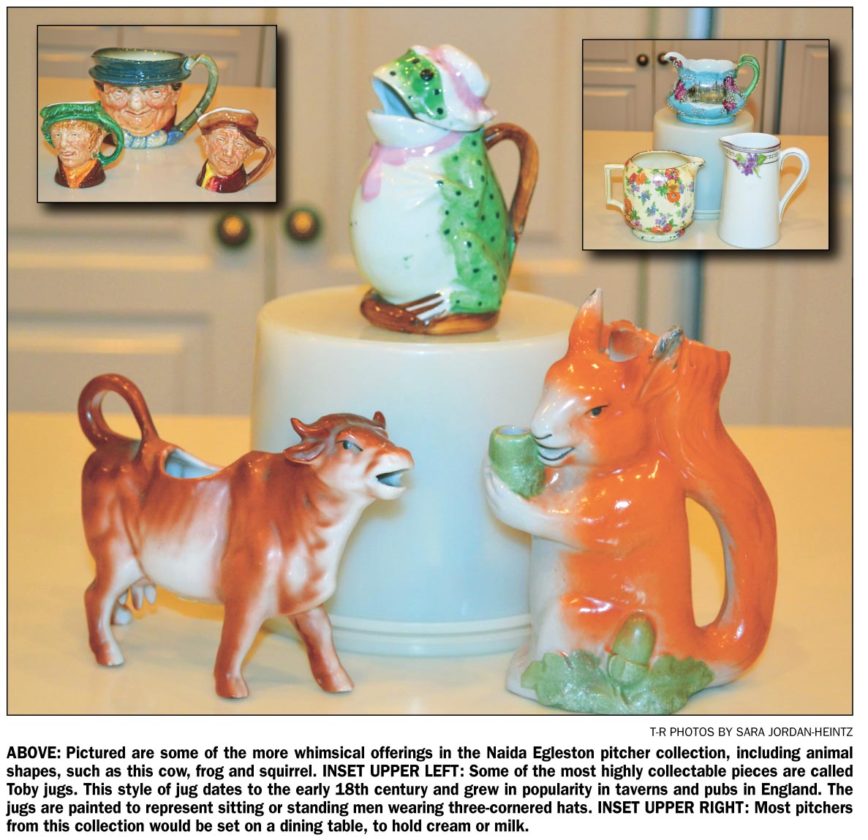Pretty as a pitcher
Binford House is home to private pitcher collection

Editor’s note: This is part of an occasional series profiling the various personal collections of residents of Marshalltown and the surrounding area.
The regal 1874-era Binford House, located at 110 N. 2nd Ave in Marshalltown, and owned and operated by the Federation of Women’s Clubs, houses antiquity belonging to the home’s original owners, Thaddeus Binford and his family, plus other objets d’art from a variety of donors and sources. Inside the home’s history room are two built-in display cases, which harbor the personal antique pitcher collection of the late Naida Block Egleston (1908-92), along with some pieces belonging to the Early American Glass Club. The pitchers donated by Egleston total about 100 pieces.
“The pitchers originally belonged to her aunt Elsie, who had them on display in her dining room,” explained Naida’s son Lee Egleston. “When she died, she left them to mom. Mom didn’t have the room at home to display them, and she sure thought a lot of the Binford House and wanted them to have the collection.”
The pitchers were gifted to the Binford House sometime in the 1950s. Naida even had custom wood shelves built for the display. The pitchers were moved to their current built-in shelving in 2004.
Naida and her husband, Leonard, were transplants from Minneapolis, having moved to Marshalltown in 1944. They established Egleston Electric Company, where Naida served as office manager.
“She was a good businesswoman, involved in the Board of Professional Women, a group that is no longer around,” said her friend and Binford House supporter, Mary Quam. “She was always out to help other women get ahead in business.”
Local glass historian Joann Neven, who serves on the Binford House board, offered some insight into the pieces in the collection.
“Naida had a broad spectrum of pitchers, ranging from functional pieces to more whimsical ones, shaped like animals, and small ones that would be purely decorative,” Neven said. “The age of the pitchers range from the early 1900s to the present, made from glass, ceramic, porcelain and pottery.”
Neven said the larger pitchers would most likely be used to hold water, milk and cream at a family’s dining table, while the ones that are smaller, and more narrow at the head, would be used to hold syrup.
“While today we use pitchers to serve lemonade and orange juice, people [in the 19th century] would not have used them for that, because lemons and oranges are perishable, and those would have been eaten directly off the fruit or squeezed into a glass instead,” Neven noted.
The word “pitcher” comes from the 13th century Middle English word “picher” defined as earthen jug. References to the use of pitchers date to the Book of Genesis and ancient Chinese civilizations. Outside North America, pitchers (defined as a container with a handle and mouth and spout for liquid), are referred to as jugs.
Pitchers, jugs and later, beer steins, came to be used to hold alcoholic beverages, especially in places and in eras where it was not safe to drink from a town’s water supply — which was most likely a polluted river in the days before modern sanitation methods.
“She was always so honored to have the pitchers on display at the Binford House, and she would point them out to everyone,” Quam said.
Some of the most highly collectable pieces Naida donated are called Toby jugs. This style of jug dates to the early 18th century and grew in popularity in taverns and pubs in England. The jugs are painted to represent sitting or standing men wearing three-cornered hats.
“You see these almost always depicting Dickens characters, and Winston Churchill was a popular one too,” said Binford House Board Member Mary Lou Tappe. “They came in all different sizes, with collectors calling the smallest one ‘tinys.'”
The pitchers are viewable by appointment only, or during regularly scheduled Binford House events. To learn more about the Binford House, which is on the National Register of Historic Places, call: 641-753-5450.
If you collect something interesting or unusual, contact this writer at the information below.
———-
Contact Sara Jordan-Heintz at 641-753-6611 or sjordan@timesrepublican.com






